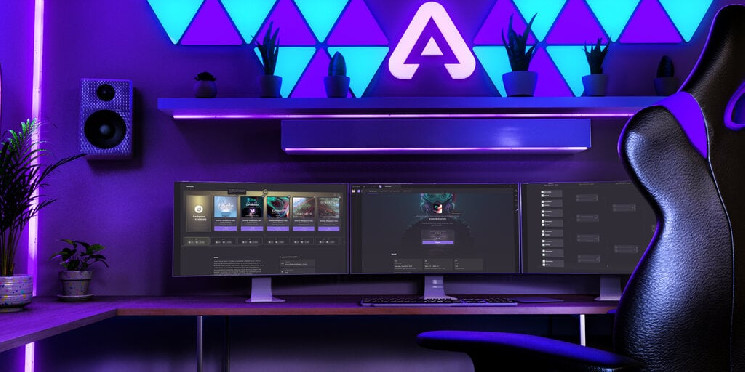Ultra, a crypto gaming startup that recently rolled out its own PC game marketplace, is launching an esports tournament platform built on its own blockchain network.
Going live on August 8, Ultra Arena will let individuals, brands, and organizations create a tournament or league, with Ultra’s UOS tokens, NFTs, or even physical products as the prize. Ultra’s goal is to build what it sees as a path for amateur video game players to jump up into the pro ranks.
At launch, gamers will be able to assert their dominance on popular PC games like League of Legends, Overwatch 2, Counter-Strike: Global Offensive (CS:GO), and PUBG, as well as games that are already available to play on Ultra Games—Ultra’s PC gaming storefront.
Ultra’s New Web3 Gaming Marketplace Lets Users Resell Digital Games
Once you win a competition via Ultra Arena, your token or NFT prize will go directly into your connected wallet. Every prize is tokenized—even claim tickets for physical items or qualification passes to other tournaments—and can be traded on Ultra’s Uniq Marketplace.
Ultra Arena was co-founded with CLD Distribution, a Belgian video game distributor. The firm’s involvement in the project will help with physical prizes being shipped globally, as well as tapping its contacts within the video game industry to bring more titles to the platform.
Road to pro
When competing on Ultra Arena, you will build a digital identity stored on the Ultra blockchain, a layer-1 network forked from the EOS blockchain. The more you compete, the more trusted you may become. And the more you win, the more respect you’re likely to get.
But if you get caught cheating, even once? You’re banned and you lose all of your hard-won reputation on Ultra Arena.
For those who play by the rules, however, that form of on-chain progress could yield future benefits, such as early access to games based on your performance and history.
“If you participated in [a lot of] tournaments, we will know how well you perform,” Nicolas Gilot, Ultra co-CEO, told Decrypt. “This can be used to say, ‘This guy is a really good FPS player. I’m going to give him early access to my FPS for him to try. I know he’ll give valuable feedback.'”
While this traceability allows for game developers and publishers to source targeted game testers, Gilot also sees the platform being used as a scouting pool for esports teams.
“What’s really cool are all the aspects around traceability of the players. Who is really good? Why? What did they do? When did they play the game?” Gilot explained. “This is really where we are heading: the road from amateur to professional.”
Bridging that gap between amateur and professional players was a key reason for creating Ultra Arena, Gilot said. It comes amid a prolonged downturn for the traditional esports industry, as team organizations and tournament platforms alike adjust to a downturn in investment and funding, potentially limiting the pathways to professional play.
Cloud9, G2 Among Esports Giants to Showcase ‘Sparkball’ in Tournament
“You have big tournaments and it kind of stops there. We thought that’s a bit sad,” Gilot said. “To actually participate in the esports scene you need to be extremely good and extremely dedicated, and between a certain age range where their reflexes are still good.”
Instead, Gilot sees Ultra Arena creating a competitive scene for a range of abilities. Amateur gamers could also be sponsored to compete on Ultra Arena. Gilot claimed that Ultra has held conversations with esports teams and that there’s “definitely interest,” but he declined to name any of the organizations.
A new model
The esports industry is mostly built on top of established games like League of Legends and Counter-Strike, and it’s major franchises like those—along with Call of Duty, Dota 2, and Overwatch—that suck up much of the attention. However, Ultra Arena also offers an opportunity for players to compete in new or even unreleased games.
“Tournaments are often done on the top titles. Obviously, you’re not going to win against the guy who has played for 10 years,” Gilot laughed. “But with a new game, everyone has a fair chance to win. I think that’s pretty exciting.”
Not only does this create a new competitive environment, Gilot suggested, but it also works as a fresh marketing tool for game developers.
“Right now, you have 800 [new] games on Steam every month, and you’re like, ‘How will people see my game now?’ Organizing a tournament is a great way,” Gilot explains. “Put a small prize pool, tap into our user base, or do co-marketing with some of the brands. Say, ‘Hey Razer,’ for example, ‘give me 10 mice and I’m going to distribute them in my game.’”
Gilot believes an esports platform designed around tokenization and crypto rewards will encourage brands to create sponsored tournaments, and said that the company has already locked in some as-yet-unnamed brands for such events.
“Whatever you put as the prize—which can be NFTs—can be branded,” Gilot told Decrypt. “If it’s traded on the secondary market, then they get a percentage back. Instead of just shedding money all the time, they get back some of that money and they can inject more into marketing. It’s a really cool loop for the marketing departments.”



